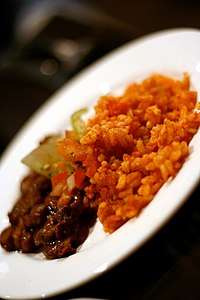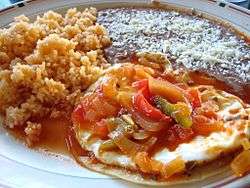Picadillo
Picadillo (Spanish pronunciation: [pikaˈðijo], "mince") is a traditional dish in many Latin American countries and the Philippines (where it is known as giniling, and also arroz a la Cubana). It is made with ground beef, tomatoes (tomato sauce may be used as a substitute), raisins, olives, and other ingredients that vary by region.[1] It is often served with rice or used as a filling in dishes such as tacos, savoury pastries or croquettes. The name comes from the Spanish word picar, that means "to mince".[1]

History
A 19th century recipe from California for pasteles a la argentina is given for a filled pastry with layers of beef picadillo and chicken cooked in a green chili and onion sauce with olive oil and raisins. "Picadillo" was not always made with beef; "picadillo de ave" was a minced fowl with white sauce. Pasteles de pollos y pichones (chicken and squab pastry) was made as a savory pie with alternating layers of chicken and squab with a picadillo of minced veal, bacon, ham fried in lard with onion, mushrooms, apples, artichokes, tomatoes, and a layer of seasonings.[2][2]
Costa Rica
Costa Rican versions always include the name of the vegetable that represents the main ingredient to the dish (potato picadillo, ayote picadillo, etc.) and that is chopped and cooked with bell peppers, onions, stock, herbs and spices. It can include some type of protein but that is not essential. It is often served with tortillas or rice.
Cuba
Cuban versions include peppers, onions, garlic, oregano, cumin, tomato sauce, stock, olives, raisins, and on occasion potatoes, and capers,[1] and is usually sauteed in olive oil and white wine, depending on the region. Cuban picadillo is served with black turtle beans and rice.[3]
Dominican Republic
In the Dominican Republic it includes peppers, red onions, garlic, tomato paste, bouillon cube, olives, capers, raisins, hard-boiled egg, cider vinegar, and allspice, and is served with either white or brown rice.
Puerto Rico
In Puerto Rico it is used as a filling for empanadas, alcapurria, piononos and other fritters. It can also be served with rice and beans. The ground meat is sauteed with annatto oil, ham, thyme, cumin, oregano, bay leaf, recaito, tomato sauce and on occasion raisin (soaked in rum), olives, capers, and potatoes.
Philippines
In the Philippines, picadillo is a soupy dish traditionally made with ground beef and either potatoes or chayote. There are also drier versions of the dish. It is also called giniling, Tagalog for ground meat. What Cubans call picadillo is known as Arroz a la Cubana to Filipinos. The Philippine version is similar to normal Latino picadillo usually made with raisins, tomato sauce and diced potatoes added, but without green olives and capers, and is often served with white rice, fried plantains (maduros in Spanish, saging na saba in Filipino) on the side, and a fried egg on top. Boiled eggs are also eaten with the dish.
Mexico
In some parts of Mexico, the dish usually calls for onions and lime to be stirred into the meat while it cooks. The sauce is sometimes sweetened by adding sugar to the pan that the meat and sauce are being fried in or, more recently, by using honey, giving the finished meal a somewhat teriyaki or bulgogi like taste. Raisins may also be added to taste. In some coastal or indigenous areas, seafood, ranging from shellfish to tuna, is substituted for the beef.
In other parts of Mexico, picadillo is made with blended guajillo chiles, and sautéed onions and tomatillos.
See also
- Sloppy Joe
- List of Mexican dishes

References
| Wikibooks Cookbook has a recipe/module on |
| Wikimedia Commons has media related to Picadillo. |
- Sifton, Sam (17 September 2014). "The Ultimate Cuban Comfort Food: Picadillo". New York Times. Retrieved 7 December 2018.
- El cocinero español by Encarnación Pinedo, 1898
- "Cuban Picadillo".


.jpg)

